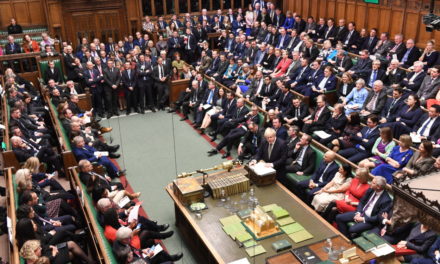The last three years will be regarded by future generations as a case study on how
not to conduct an international negotiation.
Serial errors have been made, among the most significant being the British
willingness to be sidetracked by the minutiae of the withdrawal process, to the
detriment of the ultimately more important negotiation over the shape of the
future relationship with the European Union.
This is perhaps unsurprising, given the EU’s early victory, and the UK’s
fundamental and unforced error, over the sequencing of the negotiations. This
deprived the UK of much of its negotiating leverage in areas such as trade, fishing
rights and the future security relationship and, by compartmentalizing the
negotiations, divided these elements between the withdrawal agreement and the
future relationship, to the considerable advantage of the EU.
However, one way or another, by the end of this month, or following a General
Election, this fraught chapter of our parliamentary history will draw to a welcome
close. The “dead Parliament”, as the Attorney General so aptly termed it, will
finally be buried, enabling the British people to look forward to the future outside
the EU; and that future is bright.
The UK remains the world’s fifth largest economy and tenth largest exporting
nation. Last year, UK exports reached £640 billion, an increase of 3 percent, or
£19 billion, on the previous year, and the highest since records began. UK service
exports were up by 1.4 percent and the number of SMEs trading internationally
increased by 6.6 percent.
The EU accounts for a declining proportion of UK trade, as the USA and developing
countries steadily push EU member states further down the list of the UK’s
principal trading partners. In 2018, the US overtook Germany to become the UK’s
largest supplier of imports, in addition to the UK’s largest export market, while
both the UK and USA remain the largest investors in each other’s economies.
Distracted by the collective obsession with the withdrawal process, one would also
be forgiven for failing to notice that the Government has negotiated and signed
15 free trade agreements over the last three years. These so-called ‘continuity’
agreements cover 40 countries or territories with which the UK currently benefits
from EU negotiated trade arrangements, and account for eight percent of total UK
trade.
Given its size and affluence, the UK is a very attractive market for global trade.
Not only this, but as our global import and export markets change, the greater
becomes the necessity to liberalize our trade policy; and, as the last three years
have demonstrated, the UK has the capacity to do so, and fast.
Those who advocate a close future relationship with the EU often argue that the
UK would have less influence in trade negotiations as an independent country than
as part of the EU’s trading bloc. They overlook the considerable disadvantages
that come with being part of the EU’s suffocating trade regime. Nothing better
exemplifies these disadvantages than the fraught progress of the EU-Mercosur
free trade agreement.
Free trade negotiations between the EU and the South American trade bloc began
in July 1999. At the June G20 summit in Osaka earlier this year, to much fanfare,
it was announced that an agreement had finally been achieved, at least in
principle.
However, in September, the Austrian Parliament voted, almost unanimously, to
reject the proposed agreement, citing concerns over their national agricultural
sector and the Amazon forest fires. As a consequence, the Austrian Government
is now obliged to veto the accord when it comes before the European Council.
This, in effect, means that after 20 years of negotiations the agreement is defunct
and must be re-negotiated.
Indeed, even if it could be renegotiated so as to satisfy the conditions of the
Austrian Parliament, the agreement would still have to be ratified by the
Parliaments of other member states. It could also face being permanently vetoed
should, for example, the left-wing candidate win the Argentinian election; or it
could be blocked in the European Parliament owing to the increased presence of
Green MEPs following the 2019 European elections.
It is entirely possible, therefore, that the agreement will now be put on hold,
potentially delaying the whole exercise indefinitely.
The EU-Mercosur agreement is a timely reminder of the difficulties of seeking to
negotiate trade deals as part of a large trading bloc like the EU, made up of many
member states, with vastly differing interests.
Outside such a regime, however, the UK will no longer be at the mercy of every
other EU country with the ability to exercise a veto over the UK’s trade priorities;
we will be able to act more swiftly and focus on the economic sectors that really
matter to the UK.
In seeking inspiration for our post-EU trade policy, we need look no further than
South America, though not to a member of Mercosur, but rather a nation with
whom we once shared a Queen: Chile.
The Republic of Chile is not part of any trading bloc, but instead operates a wholly
independent trade policy.
In acting independently, Chile has been remarkably successful. It has secured free
trade agreements with 64 countries, including the US, China, the EU, Canada and
Japan (incidentally, it was also one of the first countries to negotiate a trade
agreement with the UK following the 2016 referendum). Those agreements
account for over 86 percent of global GDP and secure Chile’s position as the world’s
most successful free trading nation.
When we finally move forward to our negotiations on the future UK-EU trade
relationship, the Chilean model must remain at the forefront of our consideration.
Chile’s economy is ten times smaller than that of the UK, but perfectly
demonstrates the overwhelming advantages of an independent trade policy;
imagine how successful an economy the size of the UK could be if we were
ourselves to pursue such a policy.
Exiting the EU’s slow and burdensome trade regime, liberalizing our trade with
nations around the global, negotiating solely in the national interest of the UK,
and doing so fast, must be the prize.
To secure it, we must follow the path that was beaten not by the European Union,
but by Chile.



